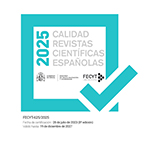Resistir las injusticias epistémicas
Más allá del “imperativo de integración” de Anderson
Resumen
En este trabajo, investigo cómo se pueden resistir las injusticias epistémicas. Miranda Fricker (2007), que introdujo el término para describir situaciones en las que personas son agraviadas en su capacidad como conocedores, tomó en un primer momento una perspectiva individualista y basada en virtudes para responder a esta pregunta. Sin embargo, las injusticias epistémicas no operan meramente a nivel individual, sino están enraizadas en prácticas y estructuras sociales. Se puede argumentar, por lo tanto, que también se necesita un cambio institucional y colectivo para contrarrestar las injusticias epistémicas. Recientemente, Elizabeth Anderson (2012) ha propuesto un remedio estructural de este tipo. A partir del diagnóstico de que la principal causa estructural de las injusticias epistémicas son los patrones de segregación social basados en desigualdades existentes, sugiere la integración como requisito para alcanzar la justicia epistémica. En oposición a esta tesis de Anderson, sostengo que ciertos espacios segregados —espacios proporcionados por contrapúblicos subalternos— pueden funcionar y han funcionado históricamente como importantes sitios de resistencia epistémica. En particular, sostengo que Anderson no reconoce de forma suficiente el potencial subversivo de estos espacios, en los que, protegidas de la mirada de los opresores, las personas marginadas pueden reunirse y cuestionar las prácticas epistémicas hegemónicas.
Descargas
Descarga artículo
Licencia
La revista Las Torres de Lucca. International Journal of Political Philosophy, para fomentar el intercambio global del conocimiento, facilita el acceso sin restricciones a sus contenidos desde el momento de su publicación en la presente edición electrónica, y por eso es una revista de acceso abierto. Los originales publicados en esta revista son propiedad de la Universidad Complutense de Madrid y es obligatorio citar su procedencia en cualquier reproducción total o parcial. Todos los contenidos se distribuyen bajo una licencia de uso y distribución Creative Commons Reconocimiento 4.0 (CC BY 4.0). Esta circunstancia ha de hacerse constar expresamente de esta forma cuando sea necesario. Puede consultar la versión informativa y el texto legal de la licencia.









